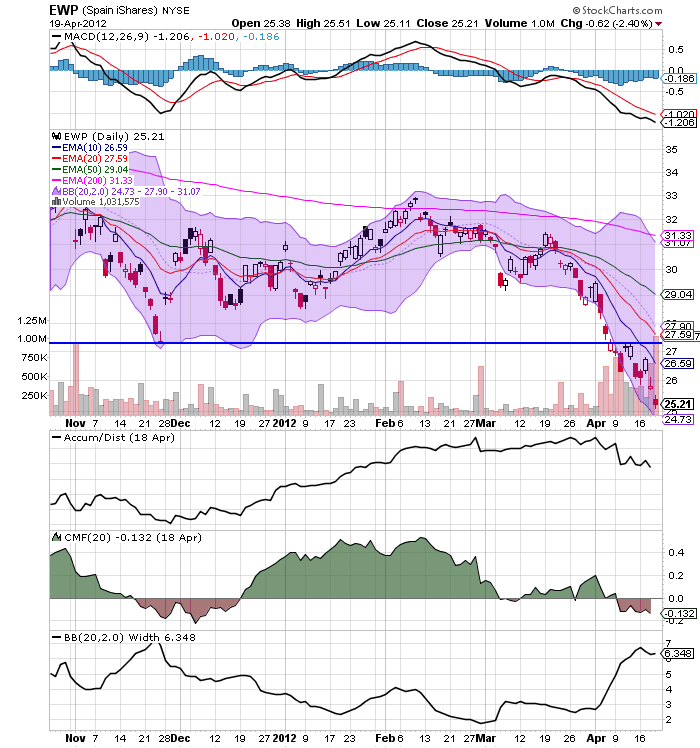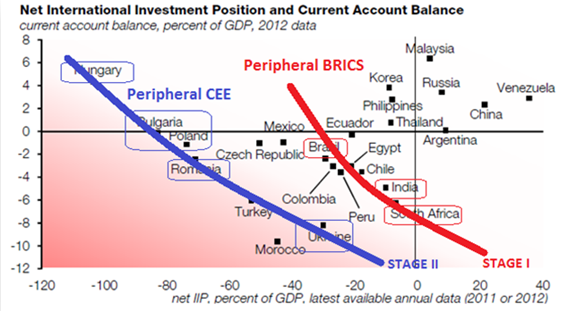Three ETFs to Watch If Roubini Is Right About Europe (EWP EWQ)
Post on: 9 Июнь, 2015 No Comment

By Eric Dutram, ETF Database | More Articles
As the investment picture has become more clouded over the past few months thanks to mounting obstacles throughout the developed world, many investors have looked to those experts with a history of navigating through challenging environments. One increasingly popular economist who has seen his stock soar in the past few years is Nouriel Roubini, a professor at New York University’s Stern School of Business. Roubini gained a cult following after his incredibly accurate predictions regarding the events of the recent financial crisis. He foretold the mortgage disaster that has left the American economy in shambles, telling economists at an IMF meeting in 2006 of the coming wave of foreclosures, the MBS mess, and the destruction that was soon to hit major financial institutions around the globe. While many were skeptical of these initial predictions, they were ultimately proven to be right on target — perhaps surprising even Roubini himself. Unfortunately, Dr. Doom doesn’t believe that the clouds are lifting just yet, as the now-famous economics professor has a rather pessimistic take on Europe’s increasingly precarious debt situation.
The Greek bailouts and the soon-to-come aid package for Ireland have struck a nerve with the NYU professor, who believes that the programs are merely transferring the risk from the banks to national balance sheets. While likely a short-term stopgap, Roubini believes that all of the European sovereign debt bailouts are only postponing the inevitable default by a major European economy; eventually, there won’t be enough cash left to prop up some of the largest members in the monetary union, which could lead to a disastrous situation. Now you have a bunch of super sovereigns — the IMF, the EU, the eurozone — bailing out these sovereigns, said Roubini in a recent CNBC interview. There’s not going to be anyone coming from Mars or the moon to bail out the IMF or the eurozone. [also read Why The European Bailout Is Just Postponing The Inevitable ]
Roubini then goes on to write in his column for the Financial Times that debt loads in countries such as Greece and Ireland are unsustainable, even with a bailout, and that a restructuring process will have to be worked out eventually:
Put simply the Irish — like the Greeks — are on a path to near or complete insolvency. Their fiscal deficit will be 30 percent of gross domestic product at the end of this year. Irish public debt will be 100 per cent of GDP at the same time, and is expected to reach at least 120 per cent in the next two years, possibly higher. Therefore there will soon need to be a public debt restructuring, regardless of the details of any temporary bail-out package. The important question facing EU policymakers is: how ought this restructuring be conducted?
Although Roubini is predicting doom, gloom, and eventual default for much of the eurozone, he does not see the damage impacting all markets equally. Below, we profile three ETFs that look to be among the hardest-hit if Roubini’s dire predictions on the future of the eurozone turn out to be spot-on [also read Three ETFs For Betting Against Europe ].
iShares MSCI Spain Index Fund ( NYSE: EWP )
One of the most immediate concerns in Europe once the Irish debt crisis is resolved is likely to be the Portuguese debt situation. Due to the severity of Portuguese debt problems, Portugal is going to lose market access — and that means they are going to require IMF support as well, according to Roubini. This situation is likely to accelerate the troubles of Portugal’s neighbor on the Iberian Peninsula, Spain. Although Spanish debt has not yet reached crisis levels, the amount of debt is what is troubling to many investors; the country has over €1 trillion in public debt and another trillion euros in private foreign liabilities. Spain’s status as one of Europe’s economies — as well as its massive debt load — makes a bailout impossible. But given the stubbornly high unemployment — Spain’s economy crumbled when construction activity disappeared — some believe that Spain is on the same path already traveled by Greece and Ireland, and could plunge the entire eurozone into a deep malaise. If Spain falls off the cliff, there is not enough official money in this envelope of European resources to bail out Spain , says Roubini. Spain is too big to fail on one side — and also too big to be bailed out.
One ETF to keep on eye on as Spain navigates increasingly treacherous fiscal waters is EWP, a fund from iShares that tracks the MSCI Spain Index. The fund holds 29 securities in total and is heavily exposed to the financial sector; two of its top three holdings are banking firms that make up more than 30% of EWP’s total assets. Furthermore, financials constitute a huge chunk of the sector allocation in the fund, with a 45% weighting, suggesting that the ETF could especially be hard hit if the debt contagion spreads to Spain. The ETF has already been one of the worst performers in the European Equities ETFdb Category so far in 2010, losing more than 20% since the beginning of the year, and nearly 15% loss in the past month alone [read Five Ultra-Concentrated ETFs ].
iShares MSCI France Index Fund ( NYSE: EWQ )
Roubini views the French economic outlook as especially dire due to the country’s generous social benefits and deeply ingrained disdain of austerity programs. This strong opposition to relatively small reforms could be the downfall of the French, according to Roubini. Sarkozy came to power saying ‘I’m going to do lots of reform.’ He has not done it, says Roubini. Right now, he is weak. He might lose the election. And, therefore, they are going to delay fiscal austerity and reforms. In fact, the French rioted for days when the retirement age was raised from 60 to 62. still one of the lower age levels in the developed world. That has caused many, including Roubini, to wonder just what the French opposition might do if harsher measures were to be enacted. What’s going to happen when you do more radical reform? That’s an open question in the case of France. This heavy level of political risk is something that investors in the French economy need to consider, especially given the weakness of France’s economy. France,Roubini says. does not look much better than the periphery.
The French economy can be accessed via EWQ, an ETF from iShares that tracks the MSCI France Index. The fund offers exposure to 80 different French companies with a heavy focus on large- and giant-cap equities; mid-cap securities make up less than 10% of the total assets. In terms of sectors, four market segments receive allocations greater than 12%: industrial materials, financials, consumer goods, and energy. Though EWQ has performed much better than its Spanish counterpart, it has still endured a dismal 2010; the fund is down close to 8%, with much of that slide occurring over the last month [see What’s Crushing The France ETF? ].
iShares MSCI Europe Financials Sector Index Fund ( NYSE: EUFN )

If investors believe that these countries will eventually have to restructure their debt or are simply too big to save, it is likely that many of Europe’s banks will suffer. With a variety of reasonably solid countries unable to take on any more private sector debt, banks will have no choice but to eat huge losses and write-down their sovereign debt portfolios. So at some point you need restructuring. says Roubini, At some point you need the creditors of the banks to take a hit — otherwise you put all this debt on the balance sheet of government. And then you break the back of government — and then government is insolvent. Roubini is already calling for the EU to develop a system for countries to easily and quickly restructure their debt in order to avoid a contagion from spreading further through the eurozone. While this program could help to save the euro, it is likely to take a heavy toll on the continent’s banks, who generally have a great deal of exposure to sovereign debt.
For investors looking for a fund to play the European financial sector — long or short–EUFN offers an interesting choice. The fund tracks the MSCI Europe Financials Index. a free float-adjusted, market capitalization-weighted benchmark that is designed to measure the combined equity market performance of the financials sector of developed and market countries in Europe. Component securities include those of banks, diversified financial companies, insurance companies, and real estate companies. EUFN holds 116 securities in total and has heavy exposure to financial firms in the U.K. (31%) with reasonable allocations going towards companies based in Switzerland (13%), France (12%), Spain (11%) and Germany (9%). This country breakdown suggests that EUFN will be heavily exposed to financial events in Ireland — via the British banks — as well as events in the rocky markets of France and Spain. Like many European ETFs, EUFN has had a rough year, plunging by more than 6% so far in 2010. If the financial crisis kicks into high gear, as Roubini has suggested is possible, losses in this ETF could mount [see Financial ETFs: Seven Ways To Play ]
[For more ETF ideas, sign up for our free ETF newsletter .]
More from ETFdb.com:
Disclosure: No positions at time of writing.
ETF Database is not an investment advisor, and any content published by ETF Database does not constitute individual investment advice. The opinions offered herein are not personalized recommendations to buy, sell or hold securities. From time to time, issuers of exchange-traded products mentioned herein may place paid advertisements with ETF Database. All content on ETF Database is produced independently of any advertising relationships. Read the full disclaimer here .
Try any of our Foolish newsletter services free for 30 days. We Fools may not all hold the same opinions, but we all believe that considering a diverse range of insights makes us better investors. The Motley Fool has a disclosure policy .














